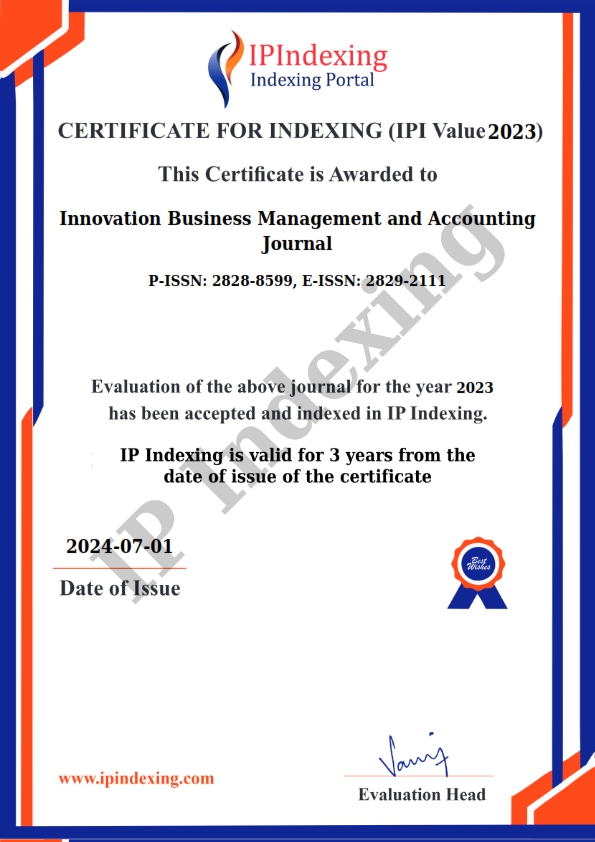Impact of Ability, Motivation and Work Discipline on Staff Performance
DOI:
https://doi.org/10.56070/ibmaj.2024.014Keywords:
Ability, Motivation, Performance, Work DisciplineAbstract
This research aims to describe the work abilities, work motivation, work discipline, and performance of Air Base (Lanud) Abd. Saleh Military security staff. Saleh Analyzes the significance level of the influence of workability, work motivation, and work discipline simultaneously, partially, and dominantly on the performance of Air Base (Lanud) Abd. Saleh Military security staff. This research includes quantitative research with comparative causal and explanatory research types. This research was conducted at Air Base (Lanud) Abd. Saleh. The choice of location for this research is based on the place studied because there has yet to be research on the influence of Ability, motivation, and discipline on the performance of Air Base (Lanud) Abd. Saleh Military security staff. Saleh Malang. The population comprised 155 enlisted members, non-commissioned officers, and first officers. The sample calculation for this study used the Slovin formula with a simple formula, so after calculating it using the Slovin formula according to Sugiyono 2011, a sample of 155 samples was obtained. The data analysis technique used is the descriptive analysis technique. Next, analysis is carried out using multiple linear regression analysis to find the influence between the independent variable (X) and the independent variable (Y). The research results show that work ability, work motivation, and work discipline significantly affect the performance of Air Base (Lanud) Abd. Saleh Military security staff. Workability, work motivation, and discipline in responding quickly to instructions positively impact staff performance by completing work on time. Work skills are needed when working as Air Base (Lanud) Abd. Saleh Military security staff, all staff must have high work motivation for this reason.
Downloads
References
Al-Musadieq, M., Raharjo, K., Solimun, S., & Achmad Rinaldo Fernandes, A. (2018). The mediating effect of work motivation on the influence of job design and organizational culture against HR performance. Journal of Management Development, 37(6), 452-469. https://doi.org/10.1108/JMD-07-2017-0239
Amin, M. (2015). Relationship between job satisfaction, working conditions, motivation of teachers to teach and job performance of teachers in MTs, serang, banten. J. Mgmt. & Sustainability, 5, 141.
Chen, M. (2019). The impact of expatriates’ cross-cultural adjustment on work stress and job involvement in the high-tech industry. Frontiers in psychology, 10, 478132. https://doi.org/10.3389/fpsyg.2019.02228
Elzahar, H., Hussainey, K., Mazzi, F., & Tsalavoutas, I. (2015). Economic consequences of key performance indicators' disclosure quality. International Review of Financial Analysis, 39, 96-112. https://doi.org/10.1016/j.irfa.2015.03.005
Kuranchie-Mensah, E. B., & Amponsah-Tawiah, K. (2016). Employee motivation and work performance: A comparative study of mining companies in Ghana. Journal of Industrial Engineering and Management (JIEM), 9(2), 255-309.
Malayu, H. (2016). Manajemen Sumber Daya Manusia Edisi Revisi. PT. Bumi Aksara.
Mangkunegara, A. A. P. (2017). Corporate Human Resource Management. Remaja Rosdakarya.
Obi, J. (2016). Performance appraisal as a tool for enhancing productivity in an organization. International Journal of Innovations in Sustainable Development, 7(2), 1-35.
Priansa, D. J. (2017). Consumer Behavior in Contemporary Business. Alphabeta.
Rizki, V. L., & Sulistyan, R. B. (2022). Manajemen Sumber Daya Manusia. Widya Gama Press.
Seven, M. A. (2020). Motivation in Language Learning and Teaching. African Educational Research Journal, 8, 62-71.
Sewell, G., & Wilkinson, B. (2019). 'Someone to Watch over Me': surveillance, discipline and the Just-in-Time labour process. In Postmodern Management Theory (pp. 151-169). Routledge.
Simorangkir, A. C., Pakpahan, B. A., & Ariawan, S. (2021). The role of leadership in improving employee discipline. Jurnal Christian Humaniora, 5(1), 125-132.
Sugiyono, & Lestari, P. (2021). Metode Penelitian Komunikasi. Alfabeta.
Sulistyan, R. B., Ermawati, E., Hidayat, Z., Lukiana, N., & Kasno. (2019). Retention Management as an Effort to Overcome the Intention of Account Officers to Stop the Company. Journal of Advanced Research in Dynamical and Control Systems, 11(12), 17-25. https://doi.org/10.5373/jardcs/v11i12/20193207
Downloads
Published
How to Cite
Issue
Section
License
Copyright (c) 2024 Hafid Cahyanto, Tanto G Sumarsono, Mokhamad Natsir

This work is licensed under a Creative Commons Attribution-ShareAlike 4.0 International License.



